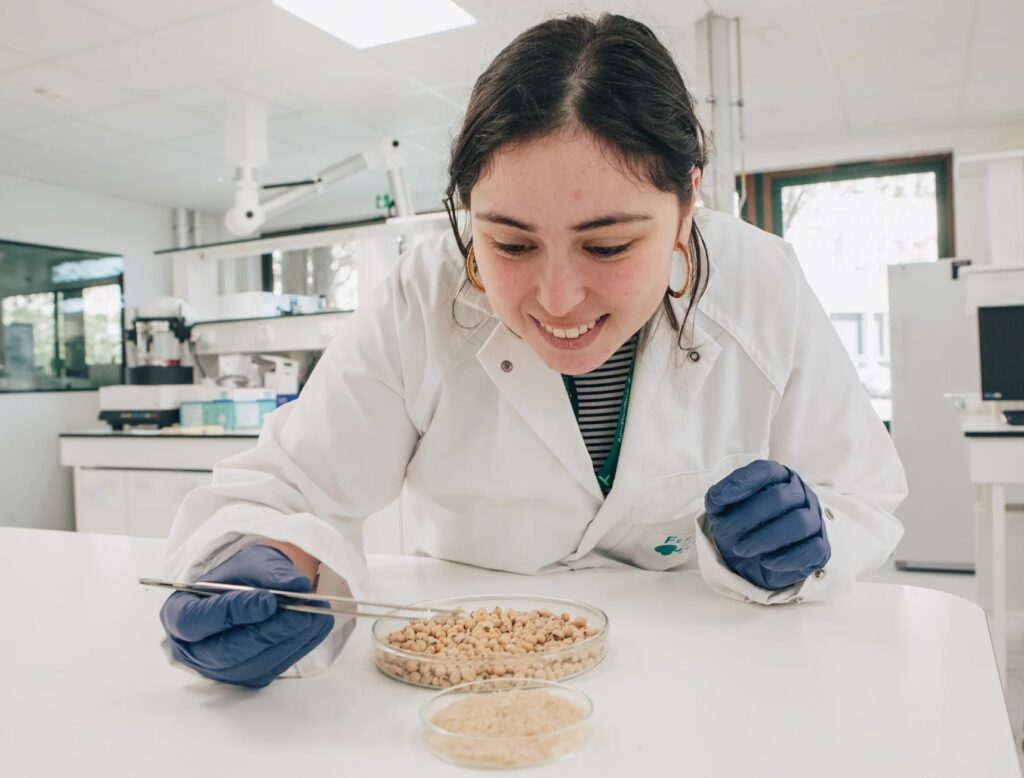
France’s Fungu’it has secured €4M ($4.6M) in funding to scale its technology that turns food waste into natural flavours for meat and cocoa alternatives.
Using fungi fermentation to transform agricultural byproducts into natural flavours for the food industry, France’s Fungu’it has impressed investors to the tune of €4M ($4.6M) in a new financing round.
Led by Asterion Ventures, with participation from Evolem and UI Investissement, the investment will help the startup build an industrial-scale pilot plant that can produce several dozen tonnes of product a year, patent its process, and develop a database from testing hundreds of combinations of microbial strains and food byproducts.
The Dijon-based firm also plans to speed up the commercialisation of its first flavour solutions, which target the taste perception of plant-based meat and the price volatility of cocoa.
“At this stage, we operate a pilot facility that allows us to produce dozens of tons per year of fermented ingredients. This is sufficient for prototyping, client testing, and early commercial runs,” says co-founder and CEO Anas Erridaoui.
“Our production process is cost-efficient, with significantly lower energy and water use compared to traditional fermentation methods, and we’ve already reached a competitive cost of production versus conventional flavour ingredients like yeast extracts.”
How Fungu’it makes its natural flavours

The flavour industry is a $20B behemoth, but in the era of clean-label ingredients and amidst the backlash against ultra-processed foods, it faces a big threat.
People have long been trying to replace artificial flavourings in favour of those that are sourced naturally. Thanks to industry convention and regulation, even seemingly benign ingredients – like yeast extract or rosemary extract are produced in a highly processed manner that would make it hard to call them “clean label”. Research has shown that most natural flavourings aren’t too different from synthetic ones in their chemical composition.
To make its natural flavours, though, Fungu’it upcycles food industry byproducts like wheat bran, brewer’s spent grains, and press cakes. They’re used as feed for fungi that grow on the surface of moist solids without the presence of free water.
“As the fungi metabolise the substrates, they generate complex flavour molecules,” explains Erridaoui. At the end of the solid-state fermentation process, the fermented material is dried and ground into a powder, yielding an ingredient with strong flavour properties (such as umami, roasted, and cocoa-like).
“Depending on the fungal strain, substrate, and fermentation parameters, we can develop a wide range of flavour profiles – from umami and roasted notes to smoky or cocoa-like aromas,” he says.
Fungu’it is currently working with strains that have a long history of safe use in food production (particularly in Asia) and are reliable for large-scale applications. “This approach ensured that we could secure a stable supply early on, even before developing our own in-house cultivation capabilities,” he suggests.
“We are building a proprietary database that maps combinations of substrates, fungi, and process conditions to their resulting flavour profiles. This ongoing work allows us to predict, select, and refine fermentations with high sensory value, adds Erridaoui.
Its process offers some big environmental wins, too. It eschews the need for tropical inputs like cocoa, uses 10 times less water and up to 50% less energy than submerged fermentation, and contributes to the circular economy by upcycling food waste. As its process doesn’t require freeze-drying or intensive mixing, it reduces the carbon footprint by 92%, according to life-cycle analyses.
Plant-based meat currently uses ‘processed, unconvincing’ flavours

While the number of Americans who say they liked the taste of meat alternatives grew over the course of 2024, it still maxed out at 36%. Unsatisfactory flavours remain a key concern for consumers. Taste tests show that only 30% of omnivores and flexitarians – the main target demographic for alternative protein producers – like the average meat-free product.
“Most meat alternatives today lack depth and authenticity in flavour. Plant proteins like soy, pea, or faba often bring off-notes or leave a bland base, and they don’t have the natural building blocks – like fats or amino acids – that develop real flavour during cooking,” explains Erridaoui. “Many brands try to fix this with yeast extracts or artificial additives, but the result is usually flat, processed, or unconvincing.”
Fungu’it’s solution is designed to enhance the sensory performance of meat analogues by adding “umami, roasted and meaty notes, making plant-based products taste like food people want to eat”.
“We’re working with a mix of major food manufacturers, specialised players, and plant-based startups in France across sectors like meat alternatives, sauces, snacks, and ready meals. Our ingredients are already being integrated into early commercial products and R&D formulations, notably in plant-based burgers, savoury snacks, and culinary bases,” he says.
“We’re also in active discussions with flavour houses, blenders, and major ingredient companies to incorporate our fermented ingredients into their portfolios. Several industrial trials are underway, with larger product launches expected in the coming months as we scale up production.”
The company’s cocoa flavour, meanwhile, can substitute cocoa in a recipe by up to 25%. It’s a solution that would appeal to chocolate companies big and small, whose profits have plunged amid supply chain disruptions and record-high prices, giving life to the burgeoning cocoa-free and cell-based chocolate industry.
Beyond meat alternatives and cocoa, Fungu’it is targeting applications with smoky notes and fermented savoury bases. “These developments are guided by our proprietary database, which we’re building to map how different coproducts, fermentation conditions, and processing steps influence flavour outcomes,” says Erridaoui.
“This allows us to screen and design new ingredients more efficiently, based on specific sensory or functional needs from our partners. The goal is to create a versatile, data-driven ingredient platform powered by solid-state fermentation.”
The post This Startup Got $4.6M To Turn Food Waste & Fungi Into Plant-Based Meat Flavourings appeared first on Green Queen.
This post was originally published on Green Queen.